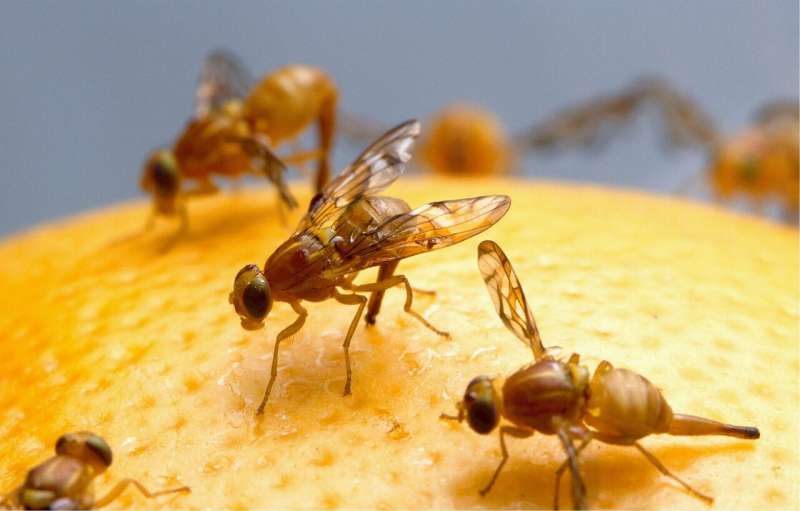This article has been reviewed according to Science X's editorial process and policies. Editors have highlighted the following attributes while ensuring the content's credibility:
fact-checked
trusted source
proofread
Researchers find simpler alternative to intermittent fasting

Monash University scientists have identified a less stringent and more manageable alternative to traditional intermittent fasting, offering new possibilities for extending lifespan and promoting healthy aging.
This novel method, involving short-term isoleucine deprivation, has shown remarkable results in fruit flies (Drosophila melanogaster), opening up new avenues for understanding dietary impacts on longevity and health maintenance.
The research, published in GeroScience found that intermittent, short-term omission of only the essential amino acid isoleucine from the diet significantly increases stress resistance and extends lifespan in fruit flies.
"Unlike conventional intermittent fasting, this approach does not require drastic reductions in overall food intake, making it a more practical and feasible strategy," said lead study author Ph.D. candidate Tahila Fulton, from the Monash University School of Biological Sciences.
"Our research not only expands our knowledge of dietary impacts on lifespan but also holds the potential to revolutionize how we approach diet and longevity," she said.
Previous research has shown that moderate restriction of all dietary amino acids can confer stress resistance, but to increase lifespan, this needs to be adhered to for long periods in adult life.
The research team recently found that short-term deprivation of a single essential amino acid can enhance toxin resistance of young adult flies, but nothing was known about its efficacy in older flies, or how this diet might affect longer-term health.
"We did not yet know if depriving a single amino acid in short bouts also extends lifespan and if so, when and for how long the restrictions need to be applied," said Tahlia, who is a member of the PiperLab research group.
To investigate this, the research team first assessed if flies could acquire nicotine tolerance from short bouts of isoleucine deprivation as they aged.
They maintained flies for one, two, three or five weeks (of their approximately nine-week mean lifespan) on a nutritionally complete synthetic diet, at which point they transferred them to a diet lacking isoleucine for one, three, five or seven days, and then measured their survival when exposed to a lethal toxin.
Using these data to select treatment regimes that offered optimal toxin protection, the authors found that subjecting flies to one week of isoleucine deprivation at mid (three weeks) and later (at five weeks) led to a remarkable increase in lifespan, irrespective of their diet in earlier and later stages of life.
"This discovery challenges existing notions about the rigid nature of dietary modifications for longevity and health benefits," said Tahlia.
The less severe approach of isoleucine deprivation mimics the benefits of broader dietary restrictions seen in conventional fasting methods.
"This research not only advances our understanding of dietary impacts on lifespan in fruit flies but also proposes a new, less-invasive pathway for aging research in other species," said Tahlia.
"The identification of specific amino acid restriction as a viable alternative to intermittent fasting opens doors for more targeted investigations into the mechanisms behind dietary interventions," she said.
More information: Tahlia L. Fulton et al, Short-term fasting of a single amino acid extends lifespan, GeroScience (2024). DOI: 10.1007/s11357-024-01078-3




















